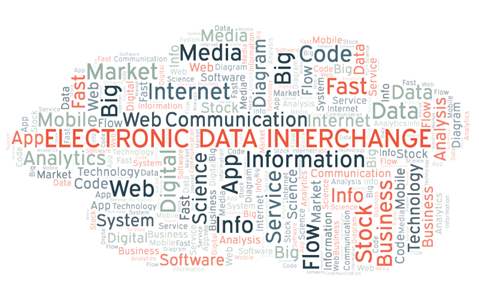
The term “Electronic Data Interchange” (EDI) might not sound familiar to everyone, but it has been around for quite a while, now. Created over 50 years ago, EDIs allow businesses to use an electronic format that is standardized when transferring information. This is crucial in ensuring suppliers and customers have access to the same data.
Integrating Supply Chain Management (SCM) with custom EDI’s can substantially impact a business and its future. In this blog, we’ll explored just why that is.
8 Ways EDIs Improve Supply Chain Management & Business Outcomes
EDI improves the overall supply chain performance in ways that generate measurable outcomes for your business. The communication system can affect all parts of the supply chain, as the efficiency of daily operations, inventory management, and information transfer are crucial.
EDI Integration improves these processes while also enabling a business to overcome common challenges:
Enhances Customer Experience (UX)
Integrating EDI with SCM streamlines the entire purchasing process with improved transparency and accuracy while reducing the possibility of confusing errors and costly mistakes.
Efficient Inventory Management
The overall management of inventory relies on accurate information between multiple locations. EDI ensures that real-time data is processed and stored for easy access and retrospective improvements.
Minimizes Cost and Time Efficiencies
Businesses need to communicate effectively with partners to maintain smooth operations, and EDI makes this possible. Real-time updates for various parts of the supply chain are organized and made easily accessible.
Zero-Latency Document Exchanges
In previous systems, document exchange has been the root of errors and costly delays. Eliminating latency dramatically affects operations because there is no delay between the sender and receiver of critical documents.
Increases Supply Chain Visibility
Improvements in the visibility of the supply chain increase the capacity for accurate decision-making. For example, accounting for excesses or shortages in the inventory can result in delays of deliveries. Being able to make these decisions quickly saves lots of money, time, and waste.
Streamlines Communication
The ability to exchange information between different business partners is essential. Not only does it keep them up to date with their orders, but it also builds trust in a business’s management ability.
Enhances Real-Time Transactions
Improvements across the supply chain happen in real-time with EDI as it can keep track of everything. From the check-out basket to the delivery truck or what is in another customer’s cart. Transactions have multiple steps involved, and custom EDI platform integrations affects all areas simultaneously.
Security
System security is integral to the overall confidence and trust in operations and services. There are many ways a business can ensure it has adequate security measures in place. For instance, when all data is encrypted, no unauthorized third parties can read or modify any messages or sensitive information.
EDI Implementation Challenges to Keep in Mind
There are some challenges involved in implementing EDI technologies in your supply chain. Understanding this is helpful when evaluating costs versus benefits.
For instance, businesses currently involved in expanding and growing might face different problems during implementation than a business that is already well-established. Stable internal processes are easier to integrate with an EDI system however this is still possible during periods of high growth.
Some of the main challenges facing businesses when implementing EDI integrations into their supply chains involve maintenance, user interaction, growth rates, and expansion:
The Complexity of Supply Chains
There is a strong tendency to underestimate the complexities of supply chain networks. Transactional methods often vary from one business partner to another, so integration relies on the standardization of EDI protocols, document types, and transaction rules.
Selecting the Right EDI System
There are different EDI programs available, and they don’t all work the same way. Selecting the right EDI supply chain system and SCM software solutions is critical to ensuring seamless implementation.
Data Integration
Data must move seamlessly across the organization’s framework, so accuracy is critical. Information entered incorrectly during the order may create errors, such as incorrect price quotes, duplicates, and inventory failures.
Detecting errors later in the chain is costly, which is why it’s always better to fix a problem sooner rather than later.
Transparency
EDI in supply chain management software improves the ability to accurately track inventory movements in real-time. This reduces the error rates associated with legacy FIFO or LIFO tracking systems, and the difficulties of interacting with third-party companies are reduced by inventory visibility.
Interoperability
Custom EDI integrations enable businesses to coordinate across all aspects of the supply chain. This includes the online platforms where orders are placed. All data is communicated across the supply chain and is constantly being updated in real-time.
The result is a system that functions at a core efficiency rate, improving end-to-end customer satisfaction and supply chain performance.
All of these need to be met by an EDI system, and here’s why:
Partner With a Reliable EDI Integration Developer
Integrated EDI in supply chain management connects parties seamlessly and enables the cost-efficient exchange of critical data.
Operations run more efficiently when redundant tasks are eliminated, and the transfer of information is accurate. Reduction of paper and manual entries also reduces human error.
Various documents are used in supply chain management software solutions, such as inventory records, shipping, payment details, invoices, remittances, route details, and bills of lading.
EDI supply chain solutions utilize support personnel and third-party software to increase efficiency and accuracy across the whole management process. Such a solution also allows for increases in efficiency and accuracy.
Before you start thinking, ‘where do I even begin with EDI?’ There is a solution to this! You see, with a custom developer, a business can have each feature of an EDI integration tailored to each of a business’s concerns and needs. This leads us nicely into the next section of this blog – custom developers:
Benefits of Custom EDI Platform Integrations
Though off-the-shelf EDI platform integrations seem like a quick and easy fix, don’t get me wrong- they are, they don’t last. An off-the-shelf solution will only solve current problems and cannot adapt to future ones. Not only that, they are also not tailored to a business’s system. In other words, an off-the-shelf solution comes as it is and stays that way.
To put this more imaginatively: Imagine buying a new gaming console, Xbox, or PlayStation; it doesn’t matter. You get home, take it out of the box, and add it to your display unit. Only it doesn’t fit anywhere. Sure, you can plug it in, and it works just fine, but it still doesn’t fit. Now you have your shiny new console on the floor and awkwardly wired into your tv. It sticks out like a sore thumb.
Offering practical, long-term solutions. A custom EDI is more beneficial and has so much to offer in the long run. Your businesses can commission customized solutions to solve personal hurdles by hiring a custom developer. Meaning you can have an EDI integration that is molded to your system.
A Future with EDI
This blog has explored the numerous benefits and challenges of integrating an EDI solution. The bottom line is the future impact it can have on your business. The cost and time saved when using EDIs are unparalleled to any other solutions available.
Any business interested in advancing and thriving in the highly competitive industry can benefit from custom solutions. It enhances customer experiences (UX) and increases data accuracy, interoperability, and processing speeds.
With customization, your integrated EDI can offer additional advancements in operational situations. It allows your business to focus its efforts on primary concerns that need a human overview. EDI will handle minor aspects of organization and data accumulation, reduce chances of human error, and save time and money spent on workforces. Enabling a reduction in operational silos and the efficient management of all processes.
To date, EDI integrations are the most effective solution for supply chain management operations. It can be utilized as an ideal strategy that allows businesses to overcome considerable challenges with its global connectivity capabilities and versatile design. As more businesses adopt this technology, they will have access to a global supply chain (that just keeps growing) and its growing capabilities.
About the Author: Dave Wood
 Dave Wood is an industry expert within the supply chain and logistics technology landscape. He has worked at Chetu since 2013 and has since built a reputation as a thought-leader within the IT community. As the Director of Global Sales at Chetu, Dave plays a critical role in assisting companies with their supply chain, retail, marketing, and media related software projects. He offers commentary on changing tides within logistics and how inventory and warehouse management systems can propel all facets of retail and supply.
Dave Wood is an industry expert within the supply chain and logistics technology landscape. He has worked at Chetu since 2013 and has since built a reputation as a thought-leader within the IT community. As the Director of Global Sales at Chetu, Dave plays a critical role in assisting companies with their supply chain, retail, marketing, and media related software projects. He offers commentary on changing tides within logistics and how inventory and warehouse management systems can propel all facets of retail and supply.
